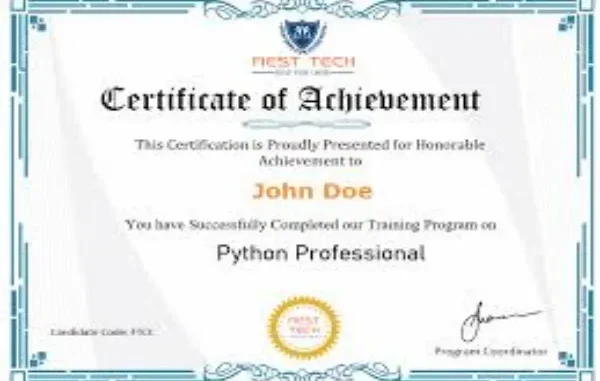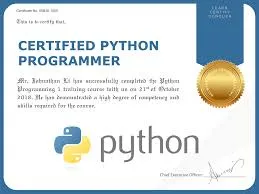
Python has established itself as one of the most popular programming languages out there! Unsurprisingly, given our previous conclusion, this simplicity and wide applicability have made Python a base language for many of the technologies we are using today (like data science, AI, cloud computing or web development).
But for those who want to get into technology, or even advance their current career in technology, taking a Python certification course has become a brilliant and strategic decision. Apart from driving home your proficiency in a field, certification paves the way for curated career paths in markets where automation, analytics, and AI-driven deployments are becoming ubiquitous.
In this article, we’ll be looking at the career opportunities after Python certification, jobs you can go for, and how Python compares to other careers, like a full-stack Java developer.
Why Python Certification Matters

Python is generally accepted as one of the easiest languages to learn, but among the most powerful to use. Though anyone can start coding with the help of tutorials, employers are open to a structured certification for multiple reasons:
- Skill Verification – Certification demonstrates that your programming ability has been measured and validated.
- Competitive Edge – Certified professionals have an edge in the job market.
- Structured Learning – Certification courses are designed in a way that all aspects of the subject matter are covered from the basic level to the expert.
- Career Transitions – Nontechnical to Tech Career Transition is designed to make you proficient in the tech industry.
- International Recognition – The certification you hold from a well-known institute has enough recognition in various organisations and countries.
Skills You Acquire From a Python Certification Course
Complete a well-rounded certification with skills that can be directly applied to job opportunities in many different industries. Typically, you’ll master:
- Core Python Programming: Language, control structures, functions and object-oriented programming.
- Data Manipulation: Processing and analysing data using libraries such as Pandas and NumPy.
- Data Visualisation: Visualising the data with Matplotlib or Seaborn charts and dashboards.
- Web Dev: Maybe Django or Flask as Backend.
- Automation: Scripting to optimise repetitive tasks.
- Database Connectivity: Working with SQL and NoSQL databases in Python.
- AI & Machine Learning Basics: From newbie to tech expert roadmap, implementing with Scikit-learn, TensorFlow or PyTorch.
- Testing & Debugging: Use of unit testing and debugging practices.
- Capstone Projects: Construct applications, such as chatbots and predictive analytics, that behave in the real world.
These are the same skills that prepare you for technical roles, and to use problem-solving in business as well.
Career Paths After Python Certification
Having finished a Python certification course, you will be opened up to a huge variety of career paths. Click below to see some choice selections:
Python Developer
- Responsibility: Develop scalable applications, APIs and backend services.
- Industries: IT services, startups, SaaS platforms.
- Reason why Python is good: With Django and Flask, your web applications can be developed rapidly.
Data Analyst
- Role: Gather, scrub, and analyse large sets of data. Make recommendations to provide actionable insights.
- Industries: Finance, retail, healthcare, consulting.
- Why Python is Useful: Libraries like Pandas, NumPy, and Matplotlib help analysts deal with MASSIVE sets of data.
Data Scientist
- Role: Develop machine learning models to address business needs.
- Industries: Tech companies, e-commerce, telecommunications, banking.
- Why Python is useful: Scikit-learn and TensorFlow make it easy to prototype predictive models.
Machine Learning Engineer
- Position: Implement and tune ML models for real-time scenarios.
- Industries: AI start-ups, enterprise IT, autonomous systems.
- Why Python Works: Python rules ML frameworks (and cloud services).
Web Developer
- Position: Design, develop and maintain web applications.
- Industries: E-commerce, education, logistics.
- Why Python Matters: With Django, you can produce secure web applications in record time.
Automation Engineer
- Job Description: Automating tedious IT or business processes.
- Industry: IT services, DevOps, customer service.
- Why Python Works: Even a lightweight language such as Python is powerful enough to automate scripts.
AI Engineer
- Role: Develop AI-based systems including chatbots, vision applications and recommendation engines.
- Industries: Healthcare, finance, creative industries.
- Teaching How Python Helps: Python is the main scripting language used for AI research and applications.
Cloud Engineer
- Position: Deploy and scale Python on cloud (AWS, GCP and Azure).
- Industries: Cloud-native migration of businesses.
- Why Python Is Useful: Python works great with cloud SDKs and APIs.
Salary Outlook for Python Professionals
Compensation is also determined by experience, location, and the specific role, but those who hold Python certification generally earn more:
- Python Developer: $70,000 to $120,000 per year.
- Data Analyst: $60,000 – $95,000 per year.
- Data Scientist: $90,000 – $150,000 per year.
- Machine Learning Engineer: $110,000 – $160,000 per year.
- AI Engineer: $100,000 – $170,000 per year.
These numbers are a testament to just how thin a career Python is.
Python Certificate vs Full Stack Java Developer
FileInputStream: It is used to read data from files using byte-oriented operations.
Although Python is great for data careers, many are also interested in becoming a full-stack Java developer. Let’s compare:
| Feature | Python Certification Course | Full Stack Java Developer |
| Ideal for | AI, Data Science, automation, and scripting-related jobs | Front-end (HTML, CSS, JavaScript) and back-end (Java, Spring Boot, Hibernate) |
| Learning Curve | Simple syntax, easier learning curve | More complex, covers more technologies |
| Industry Application | AI and analytics industries | Enterprise software and web application development |
| Common Industries | AI, data science, automation | Banking, Fintech, e-commerce |
If you plan on getting into AI/ML and data-oriented job profiles, Python Certification is for you. If you want to build enterprise applications, then choosing a full stack Java developer course is also an excellent choice.
How to Select the Best Python Certification Course
With so many options, here are important considerations:
- Career Objective – Make your class next to the job post you are targeting.
- Provider Reputation – Check for accreditations from reputed universities, tech firms, or industry organisations.
- Hands On – Make certain the course of study includes actual practical lessons.
- Flexibility – Select between on-demand and instructor-led lessons according to your availability.
- Internationally Regarded – Certifications from entities such as the Python Institute, Google, or MIT xPRO have real value.
The Future of Python Jobs after 2025
It’s only going to get bigger, given that industries are moving faster in AI and automation. AI, advanced analytics & cloud-native systems all run on Python frameworks.
At the same time, more traditional software development roles will still demand knowledge of Java and other tools. Hence, career choices like full-stack Java developers will continue to be in demand as well. Maybe it’s the professionals who can hold two opposite ideas in their heads at once: they’re portable, but large, able to restart their career with a new framework tomorrow.
Conclusion
Investing in a Python certification course is one of the best career investments for 2025 and beyond. It proves your skills, maps structured knowledge, and opens the doors to some of the most remarkable and satisfying high-paying technical jobs in data science, AI, machine learning, and web development.
It is also widely accepted that careers in Java full-stack development will mainly start from and evolve around enterprise, but the versatility of Python makes it much easier for AI-based or data-driven opportunities. The most intelligent move for today’s workforce is to specialise in the path that serves their long-term goals best—or, if one can do both and really become unstoppable.






Leave a Reply